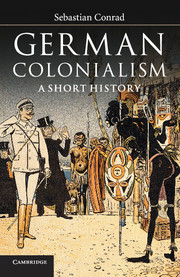Book contents
- Frontmatter
- Contents
- Illustrations
- Maps
- Acknowledgements
- Chapter 1 Introduction
- Chapter 2 Colonialism before the colonial empire
- Chapter 3 Pressure groups, motivations, attitudes
- Chapter 4 The German colonial empire
- Chapter 5 The colonial state
- Chapter 6 Economy and work
- Chapter 7 Colonial society
- Chapter 8 Knowledge and colonialism
- Chapter 9 The colonial metropole
- Chapter 10 Colonialism in Europe
- Chapter 11 German colonialism and its global contexts
- Chapter 12 Memory
- Chapter 13 Selected readings
- Index
- References
Chapter 2 - Colonialism before the colonial empire
Published online by Cambridge University Press: 05 June 2014
- Frontmatter
- Contents
- Illustrations
- Maps
- Acknowledgements
- Chapter 1 Introduction
- Chapter 2 Colonialism before the colonial empire
- Chapter 3 Pressure groups, motivations, attitudes
- Chapter 4 The German colonial empire
- Chapter 5 The colonial state
- Chapter 6 Economy and work
- Chapter 7 Colonial society
- Chapter 8 Knowledge and colonialism
- Chapter 9 The colonial metropole
- Chapter 10 Colonialism in Europe
- Chapter 11 German colonialism and its global contexts
- Chapter 12 Memory
- Chapter 13 Selected readings
- Index
- References
Summary
Pre-histories
Any retelling of German colonial history usually begins with an introduction that traces the history of overseas possessions back as far as the early modern era. Such accounts assume that demonstrating that there was already a tradition of German expansion can help to explain the development of colonialism from the 1880s onward, whether in terms of continuities of ideas or continuities in the social groups involved. More recently, Susanne Zantop has suggested a similar link on the level of cultural and discursive history. In an examination of the eighteenth- and early-nineteenth-century German literature on Latin America – before the expansion of the German empire, in other words – she attempts to identify ‘unconsciously expressed colonial fantasies’ which she sees as the root of the desire for expansion. For Zantop, these literary representations acted almost like a set of instructions for the colonial movement of the 1880s: ‘Imaginary colonialism anticipated actual imperialism, words, actions. In the end’, she summarizes, not without exaggeration, ‘reality just caught up with the imagination’.
In fact, there was a history of German possessions in foreign territories, and there were many more such plans and projects, mostly of ephemeral character. They included the colonial experiments in Venezuela, initiated by the Welser, an important family of merchants and bankers in Augsburg, between 1528 and 1556. Large land concessions granted by the Spanish emperor Charles V enabled the Welser to participate in the exploitation of raw materials (the main objective was gold), slavery, and long-distance trade of luxury goods characteristic of colonialism in the sixteenth century. Another example of the mercantilist variety of colonialism was the foundation of ‘Gross Friedrichsburg’ on the west African coast (in present-day Ghana) by the Great Elector in 1683. As the state of Brandenburg was also able to secure possession of St Thomas, one of the Antilles islands, it succeeded in participating in the triangular trade between Europe, Africa, and the Americas. But the African holdings, which were gradually extended, were sold to the Dutch in 1717 as Brandenburg was not equipped to compete with the maritime powers of the day and thus not able to safeguard its possessions. For most of the seventeenth and eighteenth centuries, the German states did not participate in colonial expansion. This was a peculiarity among the European countries and a result not least of the relatively minor role the various German states played in European power politics.
- Type
- Chapter
- Information
- German ColonialismA Short History, pp. 15 - 20Publisher: Cambridge University PressPrint publication year: 2011

